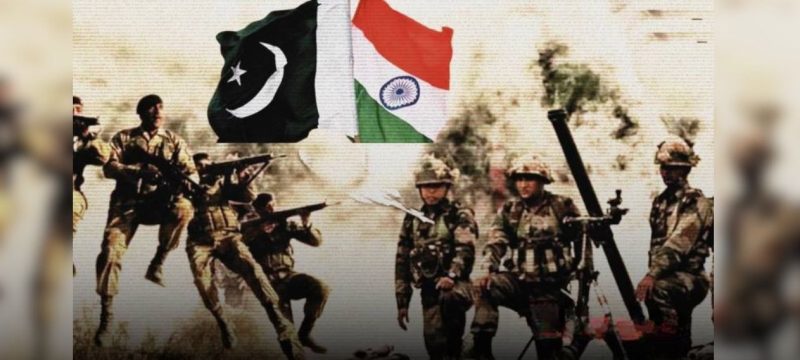Situation Appraisal
We run heedlessly into the abyss after putting something in front of us to stop us seeing it.
Blaise Pascal
Before I can discuss what Pakistan should do, it is important that the current situation is elaborated fully. Two days ago, India attacked 6 sites in Pakistan with missiles that resulted in at least 31 deaths. Several urban areas of Pakistan (in addition to others in Azad Kashmir) were targeted. A few days earlier, India had unilaterally, and illegally, announced to suspend the Indus Water Treaty indefinitely. Since then, India has been toying with the Rivers Jhelum and Chenab to flaunt the end of IWT. Significantly, India has also attacked the Neelum-Jhelum Hydropower Project in Azad Kashmir. Today, Pakistan was again attacked by drones from India. Pakistan managed to shoot down 5 Indian Aircraft during the night of 5-6 May in one of the biggest instances of air-to-air combat in the 21st century. 3 of these 5 were the much-vaunted Dassault Rafales of the Indian Air Force. Apart from this (and some artillery fire along the LoC), Pakistan has so far shown restraint and hasn’t retaliated to the Indian aggression.
Talking about the Pakistani response to Indian aggression, the “why” must be discussed before the “how”. After all, one could argue that we humiliated the Indian Air Force and downed 5 jets while our planes remained unscathed. We also destroyed a few posts along the LoC and inflicted casualties. This is enough of a response, right? Well, it isn’t. If we view the situation in proper context, it becomes clear that while the PAF has achieved a highly impressive tactical victory, strategically India has gained a massive advantage which must be squared if Pakistan is to come undamaged out of this crisis. India changed the strategic balance of the subcontinent in two important ways:
- It unilaterally suspended the IWT, a flagrant violation of international law. The silence of the international community on this is ample proof that unless Pakistan does something to underscore the fact that Pakistan can go to any lengths for its rivers, the international community will accept this Indian fait accompli like it has practically accepted the Indian occupation of Kashmir for the past 77 years.
- India has targeted heavily populated urban areas of mainland Pakistan with missile strikes and killed dozens of civilians. It did this despite having zero proof that the Pahlgam attack was Pakistan’s doing. It has arrogated to itself the posts of judge, jury, and executioner (like Israel in the Middle East). If we do not retaliate in kind, this “new normal” will be tacitly accepted by the international community. It will also enable India to commit even more brutal aggression whenever there is another attack in Indian Occupied Kashmir (which is bound to happen as India’s brutal occupation is bitterly resented by the Kashmiris).
So, in order to save the IWT and deny India the “new normal” it seeks, Pakistan must act swiftly and decisively.
Our Options
Planning for certitude is the greatest of all military mistakes.
Excerpt from “Military Strategy: A General Theory of Power Control” by Admiral J. C. Wylie
Before choosing a course of action, it is proper to examine the realistic options we have. This is war, and all options are fraught with some risk. Similarly, the quest for certitude in military planning is a fool’s errand. In the current crisis, the following options are open to us:
- Try to wind up the crisis by claiming “victory” on the basis of PAF’s drubbing of the Indian Air Force. Involve regional and global powers to ensure the end of further military activities on the Indian side and engage them diplomatically to restore the Indus Water Treaty. As the above discussion makes clear, this option is nothing more than an abject surrender before Indian aggression.
- Only targets in IOK are to be attacked. Mainland India is to be spared in order to prevent the Indian government from getting “trapped” into responding to our response, as that can lead to a limited war. This option of “limited response” would be as useless as the 1st option. It will not restore the strategic balance. Anyway, the Hindutva fascist mindset takes every concession as an admission of weakness. If India is bent on launching a limited war (and capturing some areas of Azad Kashmir), it will use even this limited response as a pretext. The global response will be muted (like it is now). Even if China comes to Pakistan’s aid, it will result in the USA tilting to the Indian side and nullifying the Chinese impact.
- Attack targets in IOK and mainland India but avoid civilian casualties. Only show the capability of hitting India, but don’t cause any damage so as not to provoke India into launching a war. This option is feasible, and it will challenge India’s “new normal”. However, it will not be a reciprocal and proportionate response, and in my opinion, only such a response can redress the strategic imbalance that India has created by its recent actions.
What Must be Done (Military)
In a serious struggle, there is no worse cruelty than to be magnanimous at an inopportune time.
Leon Trotsky
In my opinion, Pakistan must take the option of reciprocal and proportionate retaliation. There might be some civilian casualties in India, but the soft-hearted among us must remember that we have the right of reciprocity, and it was India who started it. This option is our best hope of avoiding a limited conventional war with India in Kashmir as well. Specifically, Pakistan must do the following:
- Launch ballistic missiles on the Kishanganga and/or Baglihar Dams. These strikes must be accompanied by a policy statement issued by the Government of Pakistan that Pakistan rejects India’s water terrorism and the unilateral suspension of the IWT. These strikes will serve to jolt the world and convey the message that Pakistan is willing to go to any lengths to protect its rivers.
- Launch long-range deep strikes with missiles into the heart of India. It was India that targeted our civilians and mosques in Pakistan by claiming that terrorist activities were taking place on those sites. We can reciprocate and target the Ram Mandir in Ayodhya (Modi’s vanity project). It was on this very site that the Babri Mosque was demolished and hundreds (if not thousands) of Muslims were butchered by Hindutva goons across India. A deep strike like this will show that we have full capability and the will to hit any place in India with nuclear missiles as well. It will also show that instead of a “new normal”, India will only receive a tit-for-tat response for every further aggression that might result in a nuclear war.
If we do the above-mentioned strikes, the global powers will spring into action in order to prevent a nuclear war. Every regional and global power will just focus on the cessation of hostilities, and India won’t get the opportunity to fight a limited war with Pakistan. After the ceasefire, a comprehensive settlement can then be brokered by global powers to create a framework for reinstating the IWT and responding to future terrorist attacks in both India and Pakistan.
What Must be Done (Political)
In the face of an enemy as powerful as he is cruel, victory is possible only by uniting the whole people.
Vo Nguyen Giap
Pakistan is a small country compared to India. India is 6 times more populous, has a 10 times bigger economy, and an almost 3 times larger military. India’s growing strength has added to the Hindutva craze, and many in India led by the BJP and Modi want to crush the Muslims of the whole subcontinent in order to achieve their cherished dream of “Akhand Bharat”. Even if we overcome the current crisis with honor, it is a certainty that we will be facing bigger crises in the future. A smaller and weaker country can only defeat a powerful and cruel enemy through unity, as elucidated by Vietnam, which took on the might of the USA and France, and won. This crisis is a chance for us to regain our national unity and cement it.
In the short term, the government needs to suspend politics, release jailed political leaders (most importantly Imran Khan), and summon a national platform to unify the nation in this hour of need. The opposition also needs to suspend politics and try its best to unite the people by utilizing its popularity. Imran Khan, as by far the most popular man in Pakistan today, can do much to rally the people at this point. In the long term, it must be ensured that the military stays away from politics and the constitution is followed so that a rules-based political order can take the country forward. Without this, the armed forces can never regain the love of the people, and the government can never make and enforce policies necessary for Pakistan’s welfare and security. Illegal and sham governments, coupled with a corrupt and compromised judiciary, will only destroy the trust of the people in the state. People’s trust in Pakistan and its ideology is a far more potent way of ensuring national security than even the nuclear bombs.
What Must Not be Done
In the absence of military muscle there has to be a national will and determination, as the Vietnamese had displayed. It was Pakistan’s misfortune that it lacked military strength as well as the national will to sustain the struggle.
Excerpt from “Memoirs and Reflections of a Pakistani Diplomat” by Sultan Muhammad Khan
I will end this article by briefly reiterating what Pakistan must not do. The above-mentioned excerpt from Sultan Muhammad Khan (who was the foreign secretary of Pakistan in 1971) is lamenting Pakistan’s abject surrender of 1971. More than the lack of military strength, it was the national will whose lack ensured that instead of fighting till the last bullet, we chose to surrender. It is better to burn out than to fade away, or as Tipu Sultan said, “A lion’s life for one day is preferable to a jackal’s life for a thousand days.” Both Hyderabad and Mysore were Muslim-ruled states in South India. The rulers of Hyderabad chose servility, treachery, and surrender. They lasted longer than Mysore, but their existence was shameful as they became lackeys of the British, and their end was gruesome as thousands of Hyderabadi Muslims were massacred by the Indian forces and assorted Hindutva goons. Tipu, on the other hand, preferred to lead his nation bravely and hence, became a symbol of bravery and honor for all eternity. Pakistan isn’t in the dire situation that Tipu’s Mysore was. The best outcome Tipu could get was an honorable death, but Pakistan can even achieve victory. All we need is the unity of our people, faith in our ideology, and unshakeable discipline that will enable us to weather the storm of Hindutva with patience and then turn the tide on the fascists. The surrender of 1971 must never be repeated ever again. We must never submit meekly to any fait accompli by India. Only by responding promptly and flexing our nuclear muscles can we deter India and gain peace with honor. Only by unifying our nation behind Pakistan’s ideology can we defeat the Hindutva fascists.
Disclaimer:
The views expressed in this blog are solely those of the author and do not necessarily reflect the views of organization. All information provided is for informational purposes only.







